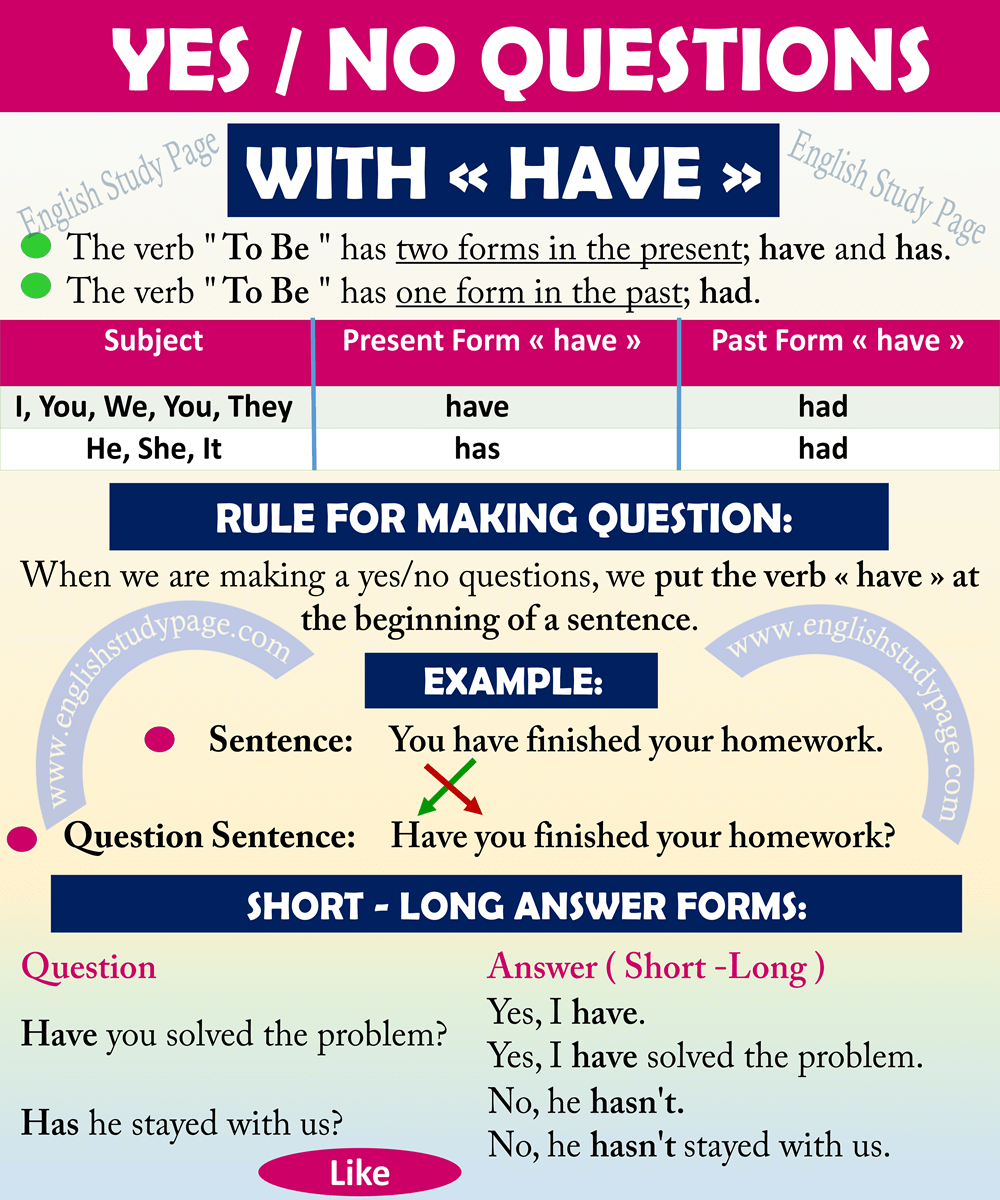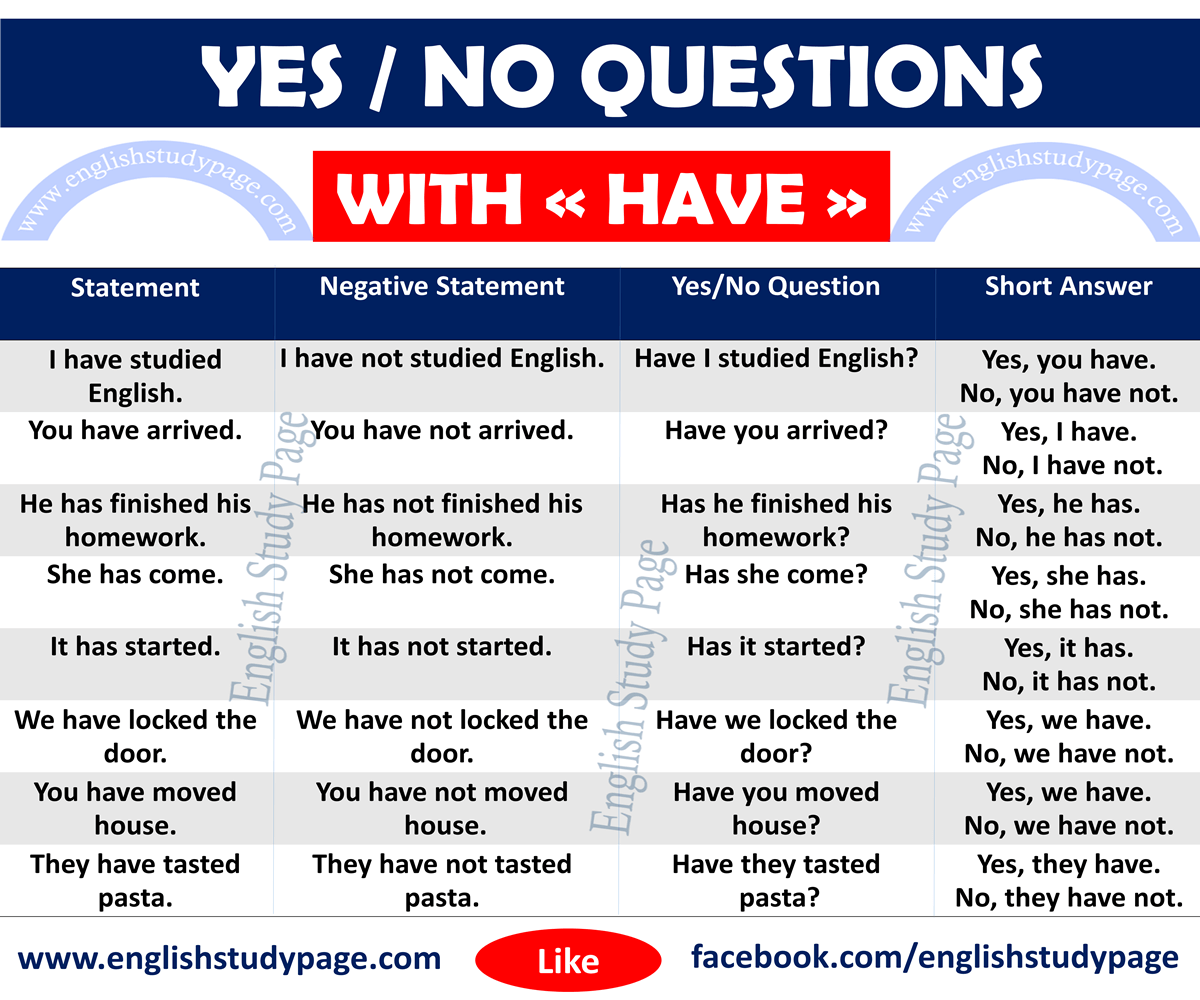TYPES OF QUESTIONS
In English, there are two main types of questions which are;
- Yes / No Questions
- Wh – Questions

YES / NO QUESTIONS
Yes / No questions are the questions which are answered yes or no. It means when we are asking yes/no questions, we are expecting the answer, yes or no.
To form Yes/No questions, we use one of these verbs: auxiliary verbs ( be, do and have ) or modal verbs ( can, may,etc.).
We can not use questions words like what, how, why, who, etc. whilw making Yes/No questions.
FORMING YES/NO QUESTIONS
Yes / No questions are made, using the verb (am, is, are, was, were, have, had, do, does, did, can, will, should etc.) at the beginning of a sentence. Namely, subject and verb change their position in statement and question.
With An Auxiliary Verb ( “Be” or “Do” or “Have” ) or Modal Verb
With “HAVE”
The verb “ Have ” has two forms in the present; have and has.
The verb “ Have ” has one form in the past; had.
| Subject | Present Form “Do” | Past Form “Do” |
| I, You, We, You, They | have | had |
| He, She, It | has | had |
We use “have” both as a main verb and as an auxiliary verb.
1. If we use “have” as a main verb in a sentence, we use “do” as an auxiliary verb to make negative and question sentences.
Example:
- I have a car. ( have is a main verb – positive sentence )
- I don’t have a car. ( we use “do” as an auxiliary verb to make the sentence in negative )
- Do I have a car? ( we use “do” as an auxiliary verb to make the sentence in question )
2. If we use “have” as an auxiliary verb ( especially before -ed (past participle) forms to make the present and past perfect tense ) in a sentence, we use “have” to make negative and question sentences.
For Prefect Tenses (Present & Past Perfect Tenses and Present & Past Perfect Progressive Tenses )
Example:
- I have finished my homework. ( have is an auxiliary verb, finish is a main verb – positive sentence )
- I haven’t finished my homework. ( we use “have” as an auxiliary verb to make the sentence in negative )
- Have I finished my homework? ( we use “have” as an auxiliary verb to make the sentence in question )
For Other Uses ( have got = have , have got to = have to ( modal verb) and had better ( modal verb))
Example:
- You have got a cat. ( have is an auxiliary verb – positive sentence )
- You haven’t got a cat. ( we use “have” as an auxiliary verb to make the sentence in negative )
- Have you got a cat? ( we use “have” as an auxiliary verb to make the sentence in question )
Not 1: “have got” and “have” mean the same. “have got” is usually used in British English, on the other hand, “have” is usually used in American English. Generally, “have got” is informal such as “have got to = have to”.
Not 2: “had better” refers to the present or the future. We use “had better” to talk about actions which we think people should do. The verb form is always had, not have. We normally shorten it as ” ’d better ” in informal situations. It is followed by the infinitive without to.
Example:
- We had better study hard. ( positive sentence )
- We had better not study hard. ( negative sentence)
- Had we better study hard? ( question sentence )
- We had better study hard, hadn’t we? ( question sentence )
- Yes, we had better. ( short answer – in short answers “had beter” is repeated )
Rules:
1. If the sentence has a main verb and an auxiliary verb “have”, question form is
Have ( as an auxiliary verb ) + Subject + Main Verb + ….
| Sentence | Question |
| I have studied English. | Have I studied English? |
| He has finished his homework. | Has he finished his homework? |
| The film had started. | Had the film started? |
| We had locked the door. | Had we locked the door? |
| They have moved house. | Have they moved house? |
2. When there is more than one auxiliary verb in a sentence ( in perfect progressive tenses and in passive voice ), we put first auxiliary verb at the beginning of a sentence, the other(s) comes after the subject. In this case,
Question Form is;
Auxiliary Verb + Subject + Auxiliary Verb + Main Verb + ….
| Sentence | Question |
| She has been reading this novel for 5 days. | Has she been reading this novel for 5 days? |
| The car had already been parked when we arrived. | Had the car already been parked when we arrived? |
| We had been looking for the wallet for 2 hours. | Had we been looking for the wallet for 2 hours? |
Do ( do, does, did ) + NOT + Subject + Main Verb + ….
| Sentence | Question |
| You haven’t seen me walking. | Haven’t you seen me walking? |
| She hasn’t come yet. | Hasn’t she come yet? |
| It hasn’t arrived yet. | Hasn’t it arrived yet? |
| We hadn’t seen each other in a month. | Hadn’t we seen each other in a month? |
| He hadn’t tasted pasta before. | Hadn’t he tasted pasta before? |
4. When we are replying the question, we can use short or long form for the answer. Answer forms are;
Yes + Subject + Auxiliary Verb ( + … )
No + Subject + Auxiliary Verb + Not ( + …. )
| Question | Answer |
| Have you ever seen any rainbow? | Yes. / Yes, I have. / Yes, I have seen a rainbow before. |
| Have I met your family? | No. / No, you haven’t. / No, you haven’t met my family. |
| Has it been started? | Yes. / Yes, it has. / Yes, it has been started. |
| Had we sold our stock? | No. / No, we hadn’t. / No, we had sold our stock. |
| Had they been married? | Yes./ Yes, they had. / Yes, they had been married. |
| Has he stayed with us? | No. / No, he hasn’t. / No, he hasn’t stayed with us. |
( generally short form is used as an answer )
YES/NO QUESTIONS WITH PRESENT FORM OF ” HAVE ( HAVE/HAS ) “

YES/NO QUESTIONS WITH PAST FORM OF ” HAVE ( HAD ) “

